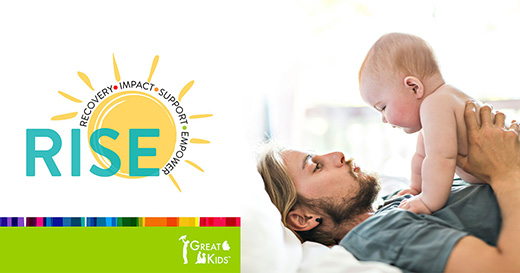|
E-News Exclusive New Home Visitor Training Looks to the Positive in Helping Families Facing Substance Use Disorder
By Jennifer Hayes “Taking the RISE course opened my eyes to a lot of things. I couldn’t understand people who struggled with substance use until I went through this training.” Taking a positive approach to assist families facing substance use disorder (SUD) is the focus of new and effective online training for home visitors. The National Institute on Drug Abuse reports that, in 2019, nearly 50,000 people died from an opioid overdose in the United States. Opioid use or overdose affects not only the individual but also family and friends. More specifically, an SUD can significantly diminish the quality of the parent-child relationship. The opioid crisis became an epidemic, with some people at a higher risk for this mental health diagnosis facing the road to recovery. SUDs can impact many aspects of life, including parenting and child development. Parents who experience SUD may struggle with feelings of guilt and shame. Beyond feeling as though they are not in control of their disorder, they may feel as if they are not good enough or have failed at being a parent. It is important for this population to understand that there are no perfect parents and that repairing relationships with their children is possible. The mission of Great Kids is to create and deliver quality products and services that shape a world where all parents and caregivers become competent in their ability to nurture children in their early childhood today, tomorrow, and for generations to come. Based on the overwhelming statistics, it became critical to our nonprofit organization to help others understand this crisis and support families experiencing or recovering from substance misuse. RISE (Recovery, Impact, Support, and Empower) is an online course developed by Great Kids, Inc. to support the early childhood field in learning more about the opioid crisis and SUD. It also provides concrete supports for working with families affected by SUDs. RISE contains about nine hours of online learning within five modules. The training is open to anyone interested in learning more about the opioid crisis and how to support those with an SUD. This course offers hope by helping participants learn concrete ways to connect parents and children that help combat the negative trajectory sometimes associated with childhood in a family struggling with SUD. Among the biggest challenges that support workers discussed concerned beliefs and language used when working with families in recovery from SUD. This is a key topic RISE explores. Stigma is very real when it comes to addiction and opioids. The way we treat and support individuals affected by an SUD can significantly impact their recovery and well-being. Making conscious decisions about our language and its effect on those around us can help us develop more empathic and supportive relationships. Understanding strengths-based language and words that can be stigmatizing can make a critical difference in the support provided. There are many common misconceptions, such as a one-size-fits-all approach to SUD treatment. The course introduces and discusses the opioid epidemic, touching on frequently asked questions and the influence of personal beliefs and societal norms. It also looks at the fundamentals of SUDs, treatment, and recovery. SUD affects the entire family regarding parenting, parent-child attachment, and child development. It is crucial that we support pregnant individuals in accessing treatment for SUDs while also encouraging them to establish the roots for a strong parent-child attachment relationship. A family-centered approach to the treatment of an SUD is extremely important. RISE explores the principles and benefits of family-centered treatment in a way that focuses on the skills needed to support families and practice applying those skills. A 2021 RISE participant says, “After going through a training just a couple of weeks ago on the opioid crisis, I didn’t feel good afterward. However, this is such a real and empowering course that shows how this crisis truly became an epidemic.” Although the course focuses on supporting the early childhood and home visiting field, the knowledge and skills gained in this training apply to anyone who works with children, parents, or families. To learn more, visit greatkidsinc.org/rise-recovery-impact-support-empower. — Jennifer Hayes is the product development manager at Great Kids. Before joining Great Kids in 2017, Hayes was a program manager for a home visiting program in Georgia, and her background includes a master's degree in counseling and psychology. |

